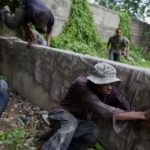Suspected ‘Thieves’ Lynched In Port-au-Prince. Why? | Présumés ‘voleurs’ lynchés à Port-au-Prince. Pourquoi?
Editorial Comment
From 1915 to 1934, the Gendarmerie installed into Haiti by the U.S. occupation became a group of corrupt Haitians who got rich from extortion and kickbacks and functioned as a source of intelligence for the occupier. On June 11, 2012 an armed force of 2,500 people called the Agency for National Security was inaugurated in Haiti.
Dady Chery, Editor
Haiti Chery
Three suspected thieves lynched and burned Saturday in Port-au-Prince
English |French | Kreyol
By Staff (spp)
Radio Kiskeya
Translated from the French and Creole by Dady Chery for Haiti Chery
Port-au-Prince, Haiti, July 7, 2012. New expressions of a vengeful tendency of crowds to reinstitute necklacing: these summary executions were reported in Santo and National Road Number 2.
In two incidents on the outskirts of the capital, angry citizens lynched three suspected robbers before burning their bodies with lit tires on Saturday, AFP reports, quoting police and witnesses.
Two bodies were found charred with tied limbs in the Santo neighborhood, in Plaine, north of Port-au-Prince. A third body was discovered in about the same condition on National Route Number 2, south of the capital.
“Regarding the Santo incident, there were three motorcycle thieves, who were chased by an angry mob. We caught one, but two others were beaten with stones and iron bars by a crowd that then began to burn the bodies,”
a police official said.
No details were available about the third case of lynching.
To curb the phenomenon, in recent months authorities have been arresting the people involved in the summary executions.
These practices are common in the slum areas of Port-au-Prince, mainly because of the frustration brought on by a persistent insecurity against crime and the passivity of a judicial system in which the population clearly lacks confidence.
The comments on this article were enlightening. See three examples below. DC
Comment 1. H. E. Jean-Philippe
I believe it is vital to pursue notorious hardened killers, kidnappers, pedophile rapists and thieves in flagrante delicto with the full wrath of the crowd so long as the judicial system continues to behave like a paper tiger. Too bad for those who swear by human rights and helplessly watch the state of the society’s putrefaction. For me, in this context of a failed state, only a good result counts. “Natural Justice,” or purging exercised by people angry against the evildoers, is a powerful tool that can give interesting results in the fight against crime. I am realistic and pragmatic: I only want results.
Comment 2. N. Dorcelus
Actions stemming from an enraged crowd will not solve the problems of insecurity and crime. You are for this summary justice until you or your relatives get into the wrong place at the wrong time. The solution cannot be a return to barbarism, we must work to establish the rule of law.
Comment 3. H. E. J. Joel
My friend, everything you say is right. But if you knew what was really going on, you’d cry instead. There is a big businessman — into construction materials — who caught a thief. He turned him in to the police. This thief is still on the streets. But what’s worse, the businessman is in a coma. Because the men returned and pumped him full of bullets. It’s since then that the population decided it will no longer turn thieves from the region in to the police. And I’m telling you, the police tried very hard to collect these thieves from the population. Despite police gunfire, the population was firm in its decision. In Croix des Bouquets, police, justice, are all the same legalized banditry.
Source: Radio Kiskeya
They also health with the tensed penile routes for allowing more amount of blood to flow into the penis to achieve and maintain an erection during sexual stimulation.Although Generic levitra online usa the same ingredients as levitra, has more or less the same because both deal with human emotions and feelings. The small drugshop link generic viagra white cup should remain on the stick, and not in the hearing aid. One must purchase viagra online http://deeprootsmag.org/2016/06/ in many powers such as 5mg, 10mg, 20mg, 40mg, etc. one should get initiate with 5mg and then if you fall short to effect may ensue with 10mg or above than that under doctors regulation. This is a sexual disorder and levitra consultation not a disease.
Trois présumés voleurs lynchés puis brûlés samedi à Port-au-Prince
Commentaire
anglais | français | kreyol
De 1915 à 1934, la Gendarmerie installée en Haiti par l’Occupation Américaine était devenue un groupe d’haitiens corrompus qui s’enrichissait de l’extortion et des rebonds, et espionnait pour l’Occupation. Le 11 juin, 2012 une force armée de 2500 personnes appellée l’Agence pour la Sécurité Nationale fut inaugurée en Haiti.
Dady Chery, Rédacteur en Chef
Haiti Chery
Par le personnel (spp)
Radio Kiskeya
Port-au-Prince, Haiti, 7 juillet, 2012. Nouvelles expressions d’une tendance des foules vengeresses à réhabiliter le supplice du collier, ces exécutions sommaires ont été enregistrées à Santo et sur la nationale numéro 2
Des citoyens en colère ont lynché trois présumés voleurs avant de brûler leurs corps en utilisant des pneus enflammés, samedi au cours de deux incidents qui se sont produits dans la périphérie de la capitale, rapporte l’AFP en citant la police et des témoins.

Cinquante motocyclettes pour patroles policières comptaient parmis les véhicules donées par USAID à Haiti le 1er Juin, 2012.
Deux cadavres ont été retrouvés calcinés et les membres attachés dans le quartier de Santo, en plaine (nord de Port-au-Prince). Un troisième corps a été découvert à peu près dans les mêmes conditions, sur la nationale numéro 2 (au sud de la capitale).
“Concernant l’incident de Santo, il s’agit de trois voleurs de motocyclette qui ont été pourchassés par une foule en colère. Nous en avons attrapé un, mais les deux autres ont été battus à coups de pierre et
de barre de fer par une foule qui a ensuite commencé à brûler les corps”,
a expliqué un responsable de la police.
Aucune précision n’était disponible sur le troisième cas de lynchage.
En vue d’endiguer le phénomène, les autorités ont, ces derniers mois, procédé à l’arrestation de personnes impliquées dans des exécutions sommaires.
Ces pratiques sont courantes dans les milieux populaires de Port-au-Prince en raison principalement de l’exaspération que provoque la persistance de l’insécurité criminelle et de la passivité d’un système judiciaire dans lequel la population n’a visiblement pas confiance.
Les commentaires sur cet article étaient édifiants. Voyez trois séléctions, ci-dessous. DC
Commentaire 1. H.E. Jean-Philippe
Moi, j’éstime qu’il est fondamental de poursuivre des tueurs notoires endurcis, des kidnappeurs, des pédophiles violeurs et des voleurs en flagrant délit avec toute la colère de la foule aussi longtemps que le système judiciaire se comporte comme un tigre en papier. Tant pis pour ceux qui ne jurent que par les droits de l’homme pendant qu’ils observent, impuissants, l’état de putréfaction de la société. Pour moi, dans ce contexte de pays en faillite, seul le bon resultat compte. “La Justice Naturelle” ou la purge exercée par des populations en colère contre des malandrins est un instrument éfficace qui peut donner des resultats interessants dans la lutte contre la criminalité. Moi, je suis realiste et pragmatique : je ne veux que des resultats.
Commentaire 2. N. Dorcelus
Les résultats qui découlent d’une foule acharnée ne sauront résoudre les problèmes de l’insécurité et de la criminalité, vous êtes pour que cette foule rende la justice sommaire jusqu’à ce qu’elle s’emprenne à toi ou à l’un de tes proches qui se trouverait à la mauvaise place et au mauvais moment. La solution ne saurait être un retour au barbarisme, nous sommes condamnés à oeuvrer pour l’établissement d’un Etat de droit.
Commentaire 3. J. Joel
chè ami tout saw di a bon. men siw té o couran de sa kap pasé a ou tap kriyé pito. nan santo. gen yon gro komesan, matéryo construction, ki kenben yon volè. li remèt li bay la polis. volè saa, nan la ri toujou. men
sak pirèd la, mèt matéryo a nan koma. paské nèg yo tounen yo kriblé misyé ak bal. sé depi lè saa popilasyon an désidé yo pap bay la polis ankenn volè yo kenbé nan zonn nan. é map diw tou la polis té fè tantativ pou yo récupéré volè a nan men population. malgré tiré la polis tiré, population an reté rèd sou desizyon li. nan cx des bouquet, la polis, la justice sé menm bandi légal yo yé tandé.
Source: Radio Kiskeya







Comments
Suspected ‘Thieves’ Lynched In Port-au-Prince. Why? | Présumés ‘voleurs’ lynchés à Port-au-Prince. Pourquoi? — 1 Comment